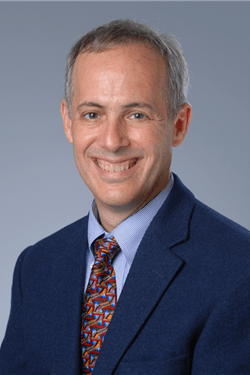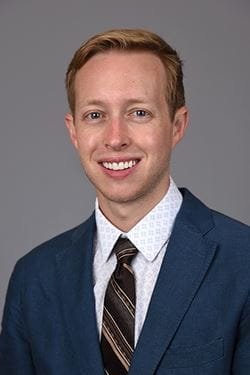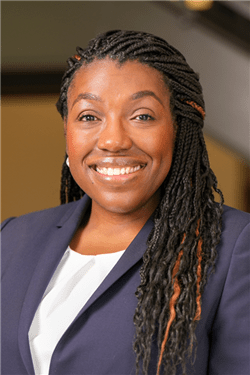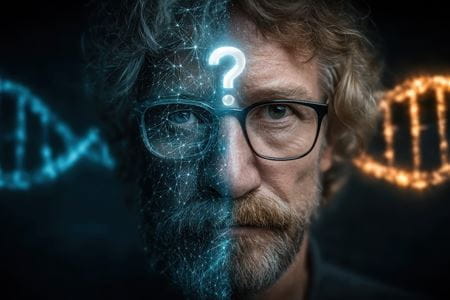New medical breakthroughs bring excitement — and a slew of ethical questions. How can we ensure blockbuster weight loss drugs are accessible to those who need them most? What limits should be placed on AI use in research and patient care? How can blood tests for diseases like Alzheimer’s and cancer be responsibly administered?
These are among the thorny questions explored by researchers at the Indiana University Center for Bioethics.
“There’s all this interaction and overlap and important questions that come up within medicine and medical policy that are about ethics and even questions of philosophy,” said Peter Schwartz, MD, PhD, the center’s director since 2017.
As both a professor of medicine at the IU School of Medicine and a professor of philosophy at IU Indianapolis, Schwartz teaches bioethics to undergraduate and graduate students, including future doctors. Other investigators at the Center for Bioethics include physicians, health care professionals and professors with degrees in areas like law, anthropology, theology and public health policy.
“We are not people who just want to think and write books,” said Schwartz. “We are people who want to improve the practice and provision of health care for the population.”
Schwartz chose a rare dual degree program at the University of Pennsylvania pairing medicine with philosophy. He now combines teaching and research with medical practice as a primary care provider with Eskenazi Health. He is also an IU Health physician, a member of the IU Melvin and Bren Simon Comprehensive Cancer Center and an affiliated scientist with the Regenstrief Institute.
 “The whole field of bioethics exists because many people inside of medicine and across society are captivated by the kinds of questions we face in trying to provide great health care,” Schwartz said. “Thinking about health and biology in a modern world where technology goes forward in leaps and bounds, we have to rethink the nature of being a human being, what it means to be healthy, what we expect from health care — these are really essential questions.”
“The whole field of bioethics exists because many people inside of medicine and across society are captivated by the kinds of questions we face in trying to provide great health care,” Schwartz said. “Thinking about health and biology in a modern world where technology goes forward in leaps and bounds, we have to rethink the nature of being a human being, what it means to be healthy, what we expect from health care — these are really essential questions.”
Among other topics, Schwartz studies shared decision making between patients and their physicians, examining measures that attempt to define “decision quality” based on a provider’s communication of treatment options and each patient’s values. As one example, a person’s values might affect how they choose to screen for colon cancer: a colonoscopy, offering a high degree of accuracy, versus a stool test, which is less invasive and more convenient.
Other center investigators focus their research on ethical questions surrounding organ transplantation, genetic testing, biobanks, end-of-life care, reproductive medicine, health care access and research integrity.
“Although we come from different backgrounds, we’re all focused on maximizing the future of health and medicine, and everybody who’s a member of the center is a nationally or internationally recognized expert in their field,” Schwartz said. “The center is a gathering place where people who are doing this kind of work can meet and learn from one another.”
Why doctors and scientists need bioethics training
Every IU medical student receives training in bioethics as part of the curriculum.
“When someone goes into health care, you really hope they would learn not only the skills and competencies to be a provider but also have a perspective on the enormous challenges of the field,” Schwartz said. “This means dealing with difficult moments of life — like birth and death and illness — but also the challenges America has, and really the whole world has, in terms of providing health care, which is so expensive.”

Likewise, it’s important for scientists to learn responsible research conduct and ethics, including avoiding conflicts of interest when working on industry-funded studies. Colin Halverson, PhD, an assistant professor of medicine and investigator with the IU Center for Bioethics, teaches both research ethics and medical ethics at the IU School of Medicine.
“My position blends my interests in ethics, medical anthropology and improving care for patients with rare diseases,” said Halverson, whose research interests include hypermobility syndromes, animal research ethics and AI large language models. “In our courses, we help our students to think critically and empathetically about their patients and research participants and to understand the social contexts and subjective concerns that may fall outside a purely medical perspective.”
Another center investigator, Lauren Nephew, MD, MA, MSc, is a gastroenterologist specializing in liver transplantation. Her interests go far beyond performing a lifesaving surgical procedure — she wants to ensure everyone on the waitlist for a transplant is treated fairly.
“Bioethics training equips physicians with the language and tools to navigate ethical and clinical complexity thoughtfully,” said Nephew, an assistant professor of medicine and associate vice chair of health equity at the IU School of Medicine. “This is especially true in transplant, where life-and-death decisions are made every day.”
She credits Schwartz with cultivating an inclusive gathering place for interdisciplinary dialogue. Schwartz calls it his “dream job.” As center director, he conducts bioethics seminars and workshops at all levels, from continuing professional education to undergraduate courses and even high school events.
“The medical school runs a program called Molecular Medicine in Action where they bring in 50 high school students from across the state and they get to work in labs and hear presentations from scientists,” Schwartz said. “I run a discussion with the room where we talk about the ethics of designing embryos and doing genetic testing and biobanking of tissue samples. It’s really fun.”
Another hot topic of bioethics lately encompasses the wave of novel weight loss drugs, including several injectables like Wegovy and Zepbound, along with a pill in development by Eli Lilly. Many people do not have insurance coverage for these GLP-1 drugs when they are prescribed for obesity.
“I’ve been around long enough to know that the dream of a safe weight loss drug was always there,” Schwartz said. “It’s a miracle with a disaster built in. These drugs can be $1,000 a month. I have patients who are significantly overweight and for whom losing weight would be a medical issue with enormous benefit, but they can’t afford it.

“How do we keep from having thin, rich people and overweight poor people?” he asks.
Schwartz and others are also exploring many facets of how artificial intelligence can be employed ethically in the medical field.
“This is a tornado for health care and for research to have the power of these machines, and it is developing so quickly,” he said. “We are confronted every day with new questions on how to do this right.”
These topics and other ethical inquiries related to informed consent, insulin affordability, genetic testing and more can be found on the IU Bioethics blog.
“Physicians routinely face decisions with significant ethical implications every day, whether it’s delivering difficult news, discussing goals of care, managing resource constraints or addressing systemic inequities,” Nephew said. “Without a foundation in bioethics, even well-meaning providers can unintentionally perpetuate harm or overlook the complex needs of vulnerable populations.”
